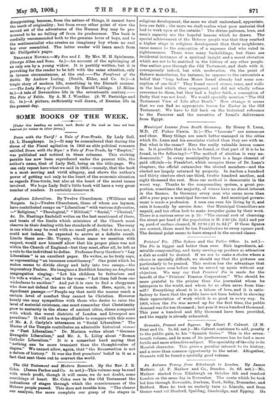Municipal Lessons from South Germany. By Henry S. Lunn, M.D.
(T. Fisher ITnwin. 2s.)—The "Lessons" are numerous and clear. Many things are much better managed in the cities which Dr. Lunn and his associates visited than they are with us. But what is the cause? Here the really valuable lesson comes in. Is it possible that it is to be found, or that part of it is to be found, in the following?—" The method of election is very un- democratic." In every municipality there is a large element of paid officials—in Frankfort, which occupies three of Dr. Lttun's chapters, the official outnumber the elected members—and the elected are largely returned by property. In Aachen a hundred and thirty electors elect one third, twelve hundred another, and eight thousand the rest. Here our method is democratic in the worst way. Thanks to the compounding system, a great pro-. portion, sometimes the majority, of voters have no direct intermit. in the finance. In Germany every man who earns more than 1.36 a year pays a municipal Income-tax. And municipal govern- ment is made a profession. A man can earn his living by it, and min it honestly by service done. Our Municipal Councillors are unpaid, and too often look to make irregular gains by their work. There is a curious error on p. 55: "The annual cost of cleansing the street per head of the population is M. 2-20 (2s. 21d.) and per sq. yard of surface cleaned, M. 22.80 (.£1 2s. 6d.)" If these figures are correct, there must be ten Frankforters to every square yard. The decimal point seems to have strayed in the second clause.






































 Previous page
Previous page